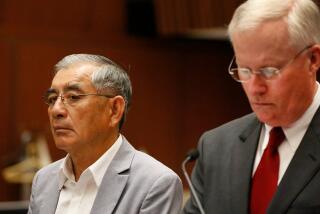State Bar Probes Deukmejian’s Top Fund-Raiser : Thrifts: The ethics investigation into the Lincoln Savings scandal also targets the state corporations commissioner and a former state official.
- Share via
The State Bar of California is investigating the ethical conduct of Gov. George Deukmejian’s chief fund-raiser, the state corporations commissioner and a former state official for their roles in the Lincoln Savings & Loan scandal.
The state bar confirmed Friday that it is looking into the conduct of gubernatorial fund-raiser Karl M. Samuelian, Corporations Commissioner Christine W. Bender and Franklin Tom, a former corporations commissioner who now is a member of Samuelian’s Los Angeles law firm.
News of the the probe ironically comes just a day after Bender’s department filed suit against Irvine-based Lincoln’s former parent and three of its officers.
Fran Bassios, the bar’s deputy chief trial counsel, said staff lawyers initiated the probe in November after reading newspaper stories that raised the possibility of ethical wrongdoing.
He said the staff must review transcripts of various testimony before it decides whether sufficient evidence exists to continue the probe and question the three lawyers. The probe could end with the review.
“We’ll move as quickly as we can on the investigation,” Bassios said.
Among those funding Deukmejian’s political campaigns was Charles H. Keating Jr., chairman of Lincoln’s parent firm, American Continental Corp. in Phoenix. A heavy contributor to state and federal campaigns, Keating and his family and business associates gave Deukmejian $150,000 for his 1986 reelection and gave the state Republican Party $100,000--through Samuelian.
American Continental had hired Samuelian’s law firm to process its applications for public offerings of subordinated debentures, which are essentially corporate IOUs.
Tom approved one bond sale in late 1986 before quitting his state post and rejoining his former law firm, Parker, Milliken, Clark, O’Hara & Samuelian. Bender, who also came from the Samuelian firm, approved the next offering in May, 1988, after her agency extensively reviewed American Continental’s request.
Samuelian and Tom met with Bender several times to counter information her agency had developed on American Continental’s apparent inability to repay the debt that it wanted to issue. In the end, the department approved the offering for sale, basing its decision on a clean bill of financial health from American Continental’s outside accounting firm and on assurances from Parker Milliken lawyers.
About 22,000 small investors bought nearly $200 million in company debentures mainly at Lincoln’s 29 Southern California branches. Those bonds became nearly worthless when American Continental filed for bankruptcy protection last April and regulators seized Irvine-based Lincoln the next day.
Bender said she was unaware of the state bar probe but welcomed investigators’ review of any of her testimony before state committees or any Corporations Department records. She said she had not violated any ethical rules in her actions involving the approval process for the bond sales.
Seth Aronson of Los Angeles, a lawyer for Samuelian and Tom, said his clients did not violate any ethical rules. He said that the state bar hasn’t notified his clients about any investigation and that he was “deeply concerned” that the bar apparently breached confidentiality provisions that are part of any investigation.
“A state bar lawyer I spoke with (Friday) could not even identify for us any particular bar rules that might have been violated,” Aronson said.
If ethical rules are violated, the bar can recommend a number of sanctions, including the revocation of a lawyer’s license to practice law.
The state Corporations Department, meanwhile, has gone on the offensive with a securities fraud lawsuit against American Continental, Keating and two of his top executives. The suit seeks restitution for bondholders and an injunction from further state securities law violations.
The agency claims that its staff and other state and federal regulators were victims, along with debenture holders, of a “colossal deception.” Keating and others “masterminded a carefully concealed campaign of fraud and deceit” that robbed thousands of Californians and others of their money, Bender said in a press conference Friday.
But American Continental said Bender’s charges are nothing new.
More to Read
Get the L.A. Times Politics newsletter
Deeply reported insights into legislation, politics and policy from Sacramento, Washington and beyond. In your inbox twice per week.
You may occasionally receive promotional content from the Los Angeles Times.










